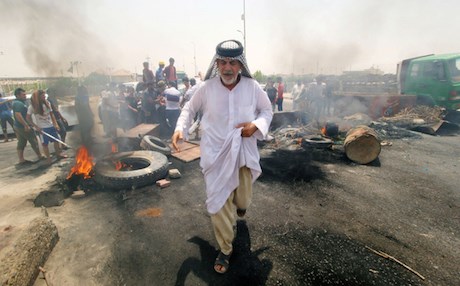US hands Iraq another 3-month exemption from Iran sanctions

ERBIL, Kurdistan Region – Washington has granted Iraq a second extension on a waiver exempting it from sanctions on Iran. For the next three months at least, Iraq will be free to continue importing energy from its neighbor.
“While this waiver is intended to help Iraq mitigate energy shortages, we continue to discuss our Iran-related sanctions with our partners in Iraq,” an unnamed US State Department official said, according to AFP.
Boosting Iraq’s domestic capabilities and diversifying its imports “will strengthen Iraq’s economy and development as well as encourage a united, democratic and prosperous Iraq free from malign Iranian influence,” the official added.
The US reimposed sanctions on Iran after withdrawing from the 2015 nuclear deal in May.
Last November, the US granted Iraq and several other countries a 45-day waiver to allow them time to gradually reduce their reliance on Iranian electricity and energy imports.
Iraq was given a second 90-day waiver in December, which was set to expire at the end of March.
Iraq suffers chronic power shortages. Years of mismanagement, corruption, and old distribution networks have contributed to a defective electricity grid that fueled protests last summer in major cities.
Washington has repeatedly urged Baghdad to end its energy dependency on Iran. However, Tehran has sought to deepen its involvement.
Earlier this month, Iran’s Minister of Energy Reza Ardkanian told state news agency Tasnim that Iran wants to play a bigger role in rebuilding Iraq’s electricity infrastructure.
On February 8, Iran and Iraq inked a deal for Iraq to buy Iranian electricity for another year. Iran exports 1,200 megawatts of electricity to Iraq.
Hassan Rouhani, the Iranian president, landed in Iraq on March 11 for a three-day state visit, during which commercial and diplomatic ties between the two states were further cemented.
Sanctions targeting Iran’s oil and finance sectors have devastated the economy and send the currency tumbling.
Under pressure from both sides, Iraqi Prime Minister Adil Abdul-Mahdi has tried to balance relations with both the US and Iran.
During his weekly press conference in Baghdad on Tuesday night, Abdul-Mahdi hailed Iraq’s growing trade relationship with all of its neighbors – not just Iran.
He also pointed out Iran is not the only local power helping Iraq weather its energy crisis.
“If we open toward Jordan, we can open well toward Iran, if we open toward Iran we can open toward Saudi, if we open toward Saudi we can open toward Turkey,” Abdul-Mahdi told reporters.
“As you know, Kuwait and Saudi Arabia provided Iraq during summer with quantities electricity for free. This is an important thing. Iran also increases quantities of electricity to Iraq. This is also an important thing, helping Iraq in its big issues and giving it great opportunities in addressing difficulties,” he added.

“While this waiver is intended to help Iraq mitigate energy shortages, we continue to discuss our Iran-related sanctions with our partners in Iraq,” an unnamed US State Department official said, according to AFP.
Boosting Iraq’s domestic capabilities and diversifying its imports “will strengthen Iraq’s economy and development as well as encourage a united, democratic and prosperous Iraq free from malign Iranian influence,” the official added.
The US reimposed sanctions on Iran after withdrawing from the 2015 nuclear deal in May.
Last November, the US granted Iraq and several other countries a 45-day waiver to allow them time to gradually reduce their reliance on Iranian electricity and energy imports.
Iraq was given a second 90-day waiver in December, which was set to expire at the end of March.
Iraq suffers chronic power shortages. Years of mismanagement, corruption, and old distribution networks have contributed to a defective electricity grid that fueled protests last summer in major cities.
Earlier this month, Iran’s Minister of Energy Reza Ardkanian told state news agency Tasnim that Iran wants to play a bigger role in rebuilding Iraq’s electricity infrastructure.
On February 8, Iran and Iraq inked a deal for Iraq to buy Iranian electricity for another year. Iran exports 1,200 megawatts of electricity to Iraq.
Hassan Rouhani, the Iranian president, landed in Iraq on March 11 for a three-day state visit, during which commercial and diplomatic ties between the two states were further cemented.
Sanctions targeting Iran’s oil and finance sectors have devastated the economy and send the currency tumbling.
Under pressure from both sides, Iraqi Prime Minister Adil Abdul-Mahdi has tried to balance relations with both the US and Iran.
Iraqi PM Abdul-Mahdi addresses his weekly press conference in Baghdad, March 19, 2019. Photo: PMO video / Facebook
During his weekly press conference in Baghdad on Tuesday night, Abdul-Mahdi hailed Iraq’s growing trade relationship with all of its neighbors – not just Iran.
He also pointed out Iran is not the only local power helping Iraq weather its energy crisis.
“If we open toward Jordan, we can open well toward Iran, if we open toward Iran we can open toward Saudi, if we open toward Saudi we can open toward Turkey,” Abdul-Mahdi told reporters.
“As you know, Kuwait and Saudi Arabia provided Iraq during summer with quantities electricity for free. This is an important thing. Iran also increases quantities of electricity to Iraq. This is also an important thing, helping Iraq in its big issues and giving it great opportunities in addressing difficulties,” he added.

